
Listen, 2016 has been…difficult. From political turmoil to national racial unrest, and the deaths of many beloved pop-icons such as Bowie, Prince, and, most recently, one of the more daring heroines the cine-verse has ever known, Carrie Fisher. But, as Sarah Condon so gracefully pointed out, 2016 wasn’t the worst year ever. As both the enthusiastic cinephile and the average moviegoer can attest, 2016 provided an admirable follow-up to an excellent year of film in 2015. Listed below are the ten best films that I saw in 2016. With a variety of genres and production levels represented, there is truly something for everyone! I hope you enjoy, and, please, don’t be shy with your opinions in the comment section below! Also, don’t miss Jason Thompson’s film wrap-up from last week.
10. ZOOTOPIA

If I had a child, and I took said child to see Zootopia this past March, I would make a mental note to re-watch the film with that child 10 years later. This cartoon is jam-packed with the emotional profundity we have grown accustomed to seeing in Disney’s Pixar films, but not as much in plain-jane Disney Animation films that usually center around the played out, “follow your dreams” theme. Lines like, “Life isn’t some cartoon musical where you sing a little song and all your inspired dreams magically come true,” show Disney’s growing awareness that their audiences are itching for more. Set in an animal kingdom where predators and prey are intended to coexist, Zootopia’s world is eerily similar to the America we live in: opportunities are promised in word, but difficult circumstances reveal a gap in what is attainable. The film suggests that if we refocus our zeal for worldly ascendance onto our empathy for others, we can, perhaps, make the world a more unified place.
9. HUNT FOR THE WILDERPEOPLE

Hunt for the Wilderpeople is a charming film out of New Zealand that tells the story of a young man named Ricky. He’s an overweight orphan who bounces around the urban foster home circuit before landing with a quirky couple in the New Zealand countryside. Ricky is introduced to the couple as an undesirable delinquent who they are not expected hold onto for very long. None of that seems to matter to his new foster mom, Bella, who looks past Ricky’s flaws from the moment she meets him. She has the chance to care for a child for the first time in her life, and she feels that she owes it to Ricky to offer every ounce of love she has to give. For his birthday, Bella sings to him, “Ricky Baker, happy birthday! Once rejected, now accepted by me and Hector!” In his new home, Ricky is safe to develop a stable identity within a caring community. As the plot progresses, the film shifts its focus to Ricky’s relationship with his foster dad, Hector. The rising conflict emerges as the two exorbitantly peculiar men hunt for a lost love under their shared bond of singular, romantic devotion. Director Taika Waititi’s ability to string humor within the deep anguish of his characters lends Hunt for the Wilderpeople a poignant aura of compassion. Its script is delightfully goofy and sentimental, making Hunt for the Wilderpeople fun, original and extremely difficult to dislike.
8. THE LOBSTER
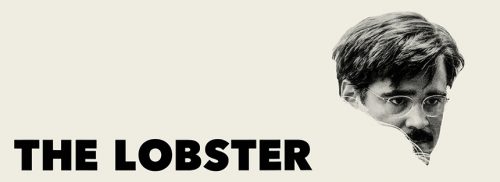
Director Yorgos Lanthimos continues to unpack the methodical anxieties of the human condition with his bizarre, yet stirring approach to film in The Lobster. An emotionally despondent and newly divorced David (Colin Farrell) checks into a treatment center for single folk seeking companionship. While enrolled in the program, he has up to 45 days to find a mate before he is transformed into the animal of his choice. David wants to be a lobster. His reasoning? The lobster can “live for over 100 years, are blue blooded like aristocrats, and stay fertile all of their lives.” His choice in animal outlines the real motivation in his search for love: it’s entirely centered around himself. In Lanthimos’ fictional world, love is frank. It’s a necessity in life because of the benefits it may offer to the individual. A couple’s compatibility is judged almost entirely by their common interests rather than their true feelings toward one another. A commentary on romance in the dating-app era, The Lobster questions both the worldly pressures that create relational boundaries and the selfish complexities that impede a flourishing love. The film raises the question, does pure love still exist? Or, is any quest to find it so colored by our own selfish desires and projections that we need a new vocabulary for our bases of connection?
7. LOUDER THAN BOMBS

Louder than Bombs is an understated gem that has unreasonably flown under the radar this year. The film navigates the treacherous landscape of family communication or lack-thereof. The always stunning Isabelle Huppert plays Isabelle, a professional wartime photographer who commits suicide after retiring in order to spend more time with her family. Isabelle’s death sends her permissive husband and her two off-kilter boys into a whirlwind of confusion and dismay. Why would she take her life shortly after freeing herself to finally share it with them? Louder Than Bombs employs melancholy dream sequences that are autobiographically narrated by those Isabelle left behind. Accented with slow motion, dim lighting and a dreary soundtrack, these scenes provide the audience an inside look at the souls of three men who struggle to voice their feelings in the moments they feel the most. At its core, Louder Than Bombs is a commentary on mourning that poses the question, does there exist a proper way to mourn?
6. GREEN ROOM
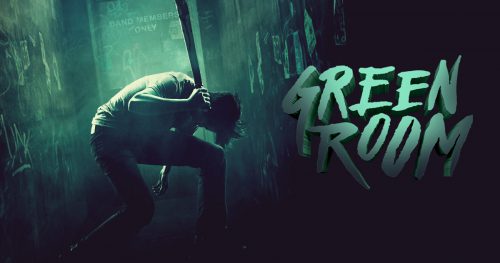
Pat, played by the late Anton Yelchin, wakes up in the backseat of a van. Peering out of the van’s windshield, he sees nothing but cornfield. Behind him is a path of flattened stalks veering off the main road. Pat is the bassist for a hardcore punk band, The Anti Rights, whose current condition is just as bedraggled as their tour van. Struggling to make enough money to drive home to D.C., they accept one last gig at a Nazi, punk commune. A literal stage sets up a figurative one. There have been gobs of politically-minded films released in recent years but perhaps none more idiomatic than Jeremy Saulnier’s third feature, Green Room. A band of three white males and an Iraqi female (Arrested Development‘s Alia Shawkat) finds itself trapped, fighting through the quicksand of a Nazi camp. Seriously, can you think of any other film that is both this punk rock AND civically pleasing? Green Room is terrifying, crude, and gory. Yet, at the same time, it’s refreshing to see some hardcore reject in the midst of a cultural cluster-cuss laying down the malevolent melee on some Nazi scum. In a welcome rewriting of a plot line that traditionally squares heroes and martyrs against unambiguous bad guys, these are just semi-normal kids. That’s a story that most of the world can get behind.
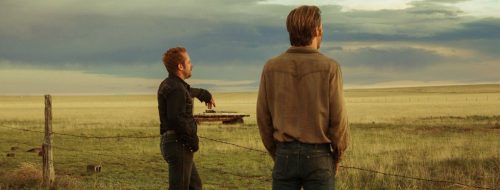
Hell or High Water shifts the western genre to a modern setting, much like the Coen brothers’ No Country For Old Men did in 2007 (and Westworld did this year on pay cable). The film’s ever rising tension is actively balanced by the affectionate banter of Tanner and Toby Howard, played by Ben Foster and Chris Pine. While Hell or High Water certainly looks and sounds beautiful, this mix of humor and anxiety in its script takes the film to another level. A good movie answers enough of its own questions that the plot avoids muddy melodrama or too many unexplained action sequences. And the dialogue should do more than mirror our real life conversations, instead informing the viewer with subtlety and respect. Writer Tyler Sheridan finds this harmonic balance in his script for Hell or High Water, his follow up to last year’s standout Sicario. Sheridan doesn’t resign himself to pitting heroes against villains. You may find yourself rooting for the film’s two bandit brothers in one scene, and the Texas rangers who are hunting them down in the next. This produces a level of empathy that shatters the good vs. evil paradigm. When permitted to see and hear both the good in the evil and the evil in the good, all parties involved can be seen for what they are: just one, big, fallen entity. It really is a thing of beauty.
4. THE VVITCH
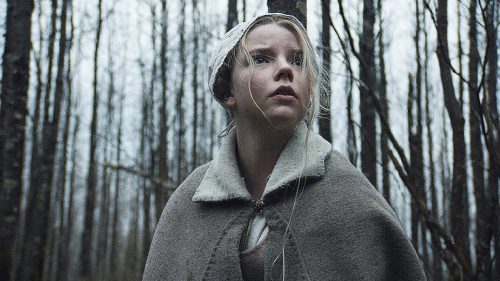
Many are calling Robert Eggers debut feature, The VVitch, the best horror film of 2016. Unlike the prototypical films of the haunted and demonic sub-genre, The VVitch does most of its damage by unsettling its viewer rather than coercing jumps and squirms. A large part of its success comes from Eggers’ meticulous attention to period detail in constructing the film’s 17th century setting. While Eggers does not claim to have based The VVitch on one historical event, he employs actual dialogue from court records and journal entries from the century that infamously gave birth to the Salem Witch Trials. This gives the film a more realistic, disconcerting tone than many of its “Based on a True Story” predecessors. The opening scene features a family on the verge of being exiled pleading its case against the harsh Puritan law of the community. William, the father, exclaims to the court, “What went we out into this wilderness to find? Leaving our country, kindred, our fathers houses? We have travailed a vast ocean. For what? For what…Was it not for the pure and faithful dispensation of the Gospels, and the Kingdom of God?” The judge has no sympathy for William and his family, banishing them to wander an unknown land. The VVitch has haunted me since I saw it in February sheerly due to its dark attitudes regarding the hope of the Law and Gospel message. At times, watching this film feels like watching chapters from the Bible. While The VVitch offers little hope, its depiction of egotistical misery and confession is provocative to say the least. The VVitch is unlike any film I’ve ever seen and deserves to be viewed and celebrated… if you can stomach it.
3. ARRIVAL
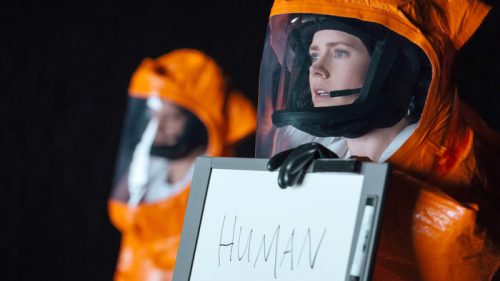
Director Denis Villeneuve’s alien thriller, Arrival, feeds off a familiar, God-centered, curiosity: could the world unify over a shared hunger for peace? Amy Adams gives an otherworldly performance as Dr. Louise Banks, an American linguist drafted by the U.S government to develop methods of communication with extraterrestrials who have parked their giant space pods all across the globe. Before seeing Arrival, I thought the plot seemed cliche: soldiers and scientists, powered by a fear of the unknown, race the clock to decipher the true intentions of unidentified life forms. However, Arrival’s uniqueness is found in the character of the aliens, the unknown. While world powers unite to eliminate the threat posed by these pods, Banks presses for increased communication with the accused. As her efforts advance, she not only gains knowledge of these creatures, but she becomes known by them. Villeneuve ingeniously uses Banks as an individual to draw attention to the possibility of peaceful global unity. Unlike any alien film I can remember, Arrival presents a higher power that resists hostility because of what it has to offer to mankind. And even as the film shifts to represent mankind as a whole, it never loses sight of Banks’ own personal tragedy and misfortune, highlighting the significance of one individual as a wonderful cog in a system much greater than itself.
2. LA LA LAND
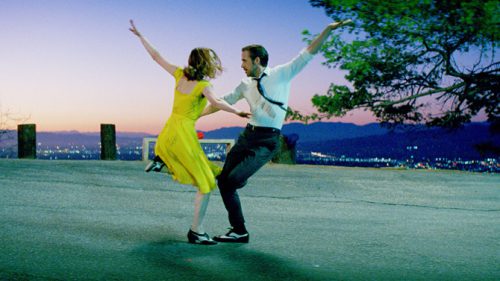
At only 31 years of age, Damien Chazelle may have already written and directed two of the best films of the decade: 2014’s Whiplash and this year’s La La Land. Did I mention that these are the only two feature films Chazelle has crafted? The guy’s batting 1.000. Mystical, magical, and all around mesmerizing, La La Land had chills running down my spine throughout its 128 minute runtime. If you skip out on La La Land because it’s part musical, you’re skimming over a one-of-a-kind, cinematic experience that blends elements of the classic romances your mother forced on you as a child with a modernized form of storytelling that explores the dark depths of mankind’s emotional consciousness.
Emma Stone and Ryan Gosling’s pre-established on screen charisma pairs perfectly with La La Land’s whimsical tone and atmosphere. Much like he did in Whiplash, Chazelle uses the film’s first act to construct a Trojan Horse of sorts; a story of individuals pursuing their dreams at all costs. Mia (Stone) and Sebastian’s (Gosling) world is galvanic and passionate, albeit still surrounded by the imposing Hollywood pulp of bikini clad blondes and soulless schemers. Song and dance along with a vibrant wardrobe and set design depict the young couple’s unadulterated adoration for both each other and their talents. The film’s second and third act then brutally disentangles the promises of fame and fortune to reveal the hazards of such pursuits. As they inch closer to their dreams, compromises are made. Metaphorically we see them drift apart from each other through the fading and darkening of the film’s color palette. The sunsets disappear. Sebastian trades in his blue wool sports coat for a black suit. Mia’s bright yellow and royal blue dresses are hung up in favor for a faded baby blue sweatshirt. Their songs fade, and what was once a musical turns into a drama as if to say that in achieving everything lies a hope for nothing.
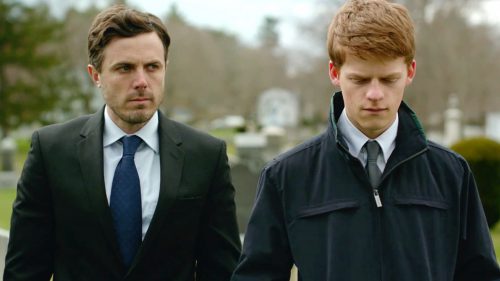
When Lee, a hermit custodian played magnificently by Casey Affleck, gets the phone call that his brother has died, he is salting sidewalks in the frigid Boston winter. The film’s audience cannot hear the voice on the other end of the line, but Lee tells whoever it is not to do what they were planning on doing, and that he’ll be there in an hour and a half. He hangs up, but moves slowly. His brother’s death is just a stone on top of the mountain of tragedy that has formed his life. It’s not that he’s grown immune to life’s mishaps, or even that he’s come to expect them. He’s just succumbed to existing within them with neither quarrel nor tranquility. Lee’s brother has left his 16 year old son, Patrick (a remarkable Lucas Hedges), in his care. It’s a task that Lee in no way sees himself fit to accept. He believes that the fault of his misfortune, which has fallen on all of his loved ones, belongs entirely to him, and he doesn’t care to add to the list. Here lies the core of Kenneth Lonergan’s third film: when life’s motif is tragedy, what does it mean bounce back? When the common counsel, “everything will be okay,” is no longer applicable, where does one look for hope? Do you look at all?
Manchester By The Sea‘s frozen setting and symphonic soundtrack give the film a funereal feel, but it’s Boston-disposition clears plenty of space for comedic relief. The film runs for 2 hours and 17 minutes, but there isn’t much extra fat to trim off. Its scenes are framed with symmetry to mimic the illusion of control that its characters, at times, pretend to possess while in the midst of their calamity. Even when the story teases with glimpses of recovery, it makes sure that its audience feels every single pothole along the road. Manchester by the Sea ends neither happily nor sadly, but with hope. In one of the films more understated, but defining sequences, Patrick has just finished having lunch with his estranged, newly born again Christian mother, who he hasn’t seen in years. In the car ride home, Lee asks him how it was. Patrick’s tone suggests that the experience was not what he was hoping for. When he sarcastically describes her new fiancé as, “very Christian,” Lee responds by asking him, “You know that we’re Christian too, right?” In proposing this question, Lee teaches Patrick a lesson in empathy: even within life’s dissimilar relationships there exist certain commonalities, usually tied to a person’s suffering, that can bring us together. In this moment the two are tied by a fleeting commonality. A trait that, when delved into honestly, boasts of its acceptance of tragedy. In an albeit not overtly religious way, here uncle and nephew discover a new hope that lies within their intimate community. While their lives are falling apart, and most likely will continue to fall apart, they have each other.
Honorable Mentions:
Jeff Nichols continued to creatively thrill audiences with Midnight Special. Dan Trachtenberg directed a wonderful continuation in the Cloverfield series with 10 Cloverfield Lane. Laika’s sustained its status as a stop motion juggernaut with its flick Kubo and the Two Strings. Vikram Gandhi gave us an interesting perspective on President Obama’s collegiate growth in Barry. Whit Stillman turned in a charming period piece adapting Jane Austen with Love & Friendship. And Mike Birbiglia and Fede Alvarez both released terrific sophomore features with Don’t Think Twice and Don’t Breathe.
Films I Failed to See In Time:
Perhaps the most noticeable film missing from my list is Barry Jenkins’ beautifully shot Moonlight that unfortunately has not yet made it to a theater near me. Check out Jason Thompson’s post for a great take on what may be the eventual Best Picture winner. Natalie Portman’s supposedly stunning portrayal of Jackie Kennedy Onassis in Jackie, director Jim Jarmusch’s poetic Paterson, Martin Scorsese’s Jesuit biopic Silence, the family, art-house drama Toni Erdmann, and Tom Ford’s Nocturnal Animals are all films that could warrant a viewing before Oscar time rolls around.

COMMENTS
8 responses to “The Top Ten Films of 2016”
Leave a Reply













You need to move ASAP!
Great list, Joe! …and thanks for the two ‘mentions’. Very gracious of you. I missed SO much in 2016. Glad you and others covered great films like ‘Manchester’, ‘La La Land’, ‘Arrival’, and some of the indie and foreign titles you mentioned. I think I’ll try to catch ‘Manchester’ before it leaves theaters in my city. Although, as timing would have it, I have a funeral to attend tomorrow… so, I hope the emotional gravity of the film won’t compound my grief. Oh and I actually cried in the last few moments of Zootopia – great depiction of friendship between the fox and the bunny (sorry, I can’t recall characters’ names after I see films!).
Thanks for the kind words Jason! Sorry to hear about your loss. Do check out MBTS. It really is one of the year’s best. Zootopia certainly pulls on the heart strings!
So glad you included Wilderpeople, J. Kind of remarkable how few good comedies saw the light of day last year.
It really was a bit dismal in that department. But HFTW was really great!
Looking forward to watching a few of these over the long weekend! I am way behind on my movie consumption.
Also, The Vvitch is streaming on Amazon for those with prime subscriptions.
Thanks for the heads up Page!
Along with The Witch, Louder Than Bombs, The Lobster and Green Room are also available for Amazon Prime members